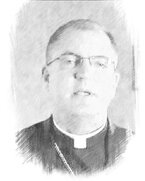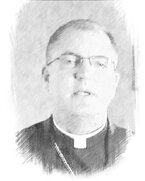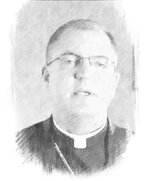dietrich von hildebrand

Dietrich Richard Alfred von Hildebrand (12 October 1889 – 26 January 1977) was a German Roman Catholic philosopher and religious writer. Hildebrand was called "the twentieth-century Doctor of the Church"by Pope Pius XII. He was a leading philosopher in the realist phenomenological and personalist movements, producing works in every major field of philosophy, including ethics, metaphysics, epistemology, philosophical anthropology, social philosophy, and aesthetics.
 Dietrich Von Hildebrand
Dietrich Von Hildebrand
"..we must stress above all the fact that we humans are in God's hands, that He alone must decide when we shall die. In death we are touched by God in a unique way. Unlike so many events in our earthly life, death neither includes or depends on our free cooperation: we undergo death. God alone is the Lord of life and death. Essentially linked to this truth is another one: on the purely natural plane, death can dominate us. Once it has occurred there is no way to reverse it. But it is not within our power to deprive another human of life? Can we not intervene and cause the death of another? Certainly. But this possibility--and frightening actuality--has no significance when we realize that God alone has the right to dispose of innocence human life.
Legitimate human authority, of course, acting as God's partial representative on earth, may punish certain crimes with death. And we may lawfully kill an aggressor in self-defense. But a frightful wrong, a very serious sin occurs when we take the life of an innocent person of our own free will. The same sin is present when we take our own life. Murder and suicide thus are indeed possible and available to us--yet only in the same ways as are other sins. Their being possible does not change the fact that to God alone belongs the right to rule human life and death. Murder and suicide directly attack their high value of human life and are sins for this very reason. Murder is the most extreme from of irreverence and lack of love. As Plato argued, when we commit murder, we usurp a right that belongs to God alone. --Dietrich von Hildebrand; Jaws of Death Gate of Heaven; [c]1980
Legitimate human authority, of course, acting as God's partial representative on earth, may punish certain crimes with death. And we may lawfully kill an aggressor in self-defense. But a frightful wrong, a very serious sin occurs when we take the life of an innocent person of our own free will. The same sin is present when we take our own life. Murder and suicide thus are indeed possible and available to us--yet only in the same ways as are other sins. Their being possible does not change the fact that to God alone belongs the right to rule human life and death. Murder and suicide directly attack their high value of human life and are sins for this very reason. Murder is the most extreme from of irreverence and lack of love. As Plato argued, when we commit murder, we usurp a right that belongs to God alone. --Dietrich von Hildebrand; Jaws of Death Gate of Heaven; [c]1980
 Dietrich Von Hildebrand
Dietrich Von Hildebrand
"I do not wish to elaborate upon all the different aspects of death with respect to their unique characteristics. Even so, I must mention briefly a view of death as a friendly liberator which can be misleading. For example, Schubert's moving song 'Der To und das Madchen' (Death and the Young Girl) does not represent death as something gruesome or frightful, to be avoided under all circumstances. It is not portrayed or frightful, to be avoided under all circumstances. It is not portrayed as a calamity toward which we all draw near, reluctantly and inevitably. Rather, this song depicts death as a bestower of gentle rest, a liberation from all earthly suffering, and from all fear and uncertainty.
As a poetic approach, the aspect presented by the song has as a certain merit since it does have a basis in fact. But the approach is flawed and obviously one-sided. Above all, it is incompatible with the Christian and supernatural view of death. In no way does it take into account the fact that death is a punishment. Itis not at all that view of death found at the heart of St Paul's stirring, triumphant charge: "O death, where is thy Sting?" (I Cor 15:15). "
--Dietrich von Hildebrand; Jaws of Death Gate of Heaven; [c]1980
As a poetic approach, the aspect presented by the song has as a certain merit since it does have a basis in fact. But the approach is flawed and obviously one-sided. Above all, it is incompatible with the Christian and supernatural view of death. In no way does it take into account the fact that death is a punishment. Itis not at all that view of death found at the heart of St Paul's stirring, triumphant charge: "O death, where is thy Sting?" (I Cor 15:15). "
--Dietrich von Hildebrand; Jaws of Death Gate of Heaven; [c]1980
 Dietrich Von Hildebrand
Dietrich Von Hildebrand
"Death is extraordinarily intimate. despite the fact that all men must undergo this common, mysterious fate at one time or another, death is still in a special way a most individual matter for each of us. Death comes to everyone as a totally intimate and personal fate. It is a basic element of each humans destiny. However different our lives may be in all other respects, each of shares the fate of death with all our fellow humans. At the same time, death is most intimate. It concerns each of us in a totally unique and individual way. Each human being must be prepared for his own death; each feels anxiety precisely over the inevitable occurrence of his own death. When he learned from the prophet Isaiah that the hour of his death had come, King Hezekiah turned in his bed toward the wall and wept bitterly. This passage from the Old Testament clearly shows us two things: death is a dreadful misfortune for humanity, and death is simultaneously a most intimate affair for each of us individually. " --Dietrich von Hildebrand; Jaws of Death Gate of Heaven; [c]1980
 Dietrich Von Hildebrand
Dietrich Von Hildebrand
Our metaphysical situation--as pilgrims in time with an all-too-mortal body--is the basis for our consciousness that we shall have to die at some future time (and, normally, as a certain age). It is the basis also of consciousness that at any moment death may claim us and carry us off, whatever our expectations. Thus "in the midst of life we are surrounded by death" and we sit "in the shadow of death." In these two expressions the entire quality of death confronts us.
--Dietrich von Hildebrand; Jaws of Death Gate of Heaven; [c]1980
--Dietrich von Hildebrand; Jaws of Death Gate of Heaven; [c]1980

